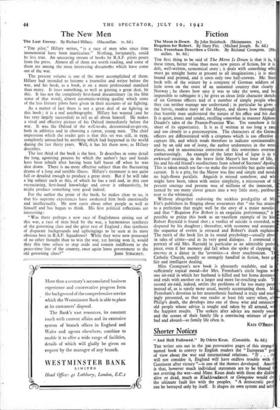Fiction
The Moon is Down. By John Steinbeck. (Heinemann. 5s.) Requiem for Robert. By Mary Fitt. (Michael Joseph. 8s. 6d.) Mrs. Frensham Describes a Circle. By Richmal Crompton. millan 8s. 6d.) THE first thing to be said of The Moon Is Down is that it is, f these times, better value than most new pieces of fiction, for it is
deft, well-written, economical story ; it deals with something whi must go straight home at present to all imaginations ; it is nic bound and printed, and it costs only two half-crowns. Mr. Ste beck tells of the seizure by a company of German soldiers of little town on the coast of an unnamed country that dearly Norway ; he shows how easy it was to take the town, and ho impossible to subjugate it; gives us clean little character sketch of six German officers ad of a number of simple people who they can neither manage nor understand ; in particular he gives the heroic, modest story of the Mayor, and shows how thorou - that humble man understood the nature of his office and his du It is quiet, ironic and tender, recalling somewhat in manner Alphon Daudet's tales of the Franco-Prussian War. Yet somehow it fa short of its opportunity. It is as if written at too long a ran and too closely to a preconception. The characters of the Germ officers are differentiated with a crispness which is too effective capture life, and which tends therefore to indicate sentimentality and by an odd use of irony, the author understates in the wro places, and in unconscious correction of this sometimes oversta embarrassingly. An example of the latter kind of lapse is in awkward- straining, in the brave little Mayor's last hour of life, his and his old friend's recollections from school of Socrates' Apolo This is taken much too far—to make the irresistible but quite un curtain. It is a pity, for the Mayor was fine and simple and need no high-flown parallels. Anguish is missed somehow, and w might have been, taken with entire simplicity, a microcosm of t present courage and present woe of millions of the innocent, turned by too many clever graces into a wry little story, perilou near to the whimsical.
Without altogether endorsing the reckless prodigality of M. Fitt's publishers in flinging about assurances that " she has attain to a perfection that might well be the envy of a major novelist and that "Requiem For Robert is an exquisite performance," it possible to praise this book as an •excellent example of its Robert Raynald is found shot ; a verdict of suicide is recorded, a disputed by his daughter ; thereafter, with economy and assuran the sequence of events is retraced and Robert's death explain The merit of the book lies in its sound psychology—usually abs in tales of crime—and in its very good dialogue. I commend portrait of old Mrs. Raynald in particular as an admirable per piece, even if her memory did fail when she spoke of clapping f encores at a dance in the 'seventies—a sheer anachronism. Catholic Church, usually so strangely handled in fiction, here g fair and intelligent dealing.
Miss Crompton's new book is pleasantly readable, and in sufficiently topical mood—for Mrs. Frensham's circle begins wt one air-raid in which her husband is killed and her home destroy and ends with another on a larger and more far-reaching scale. second air-raid, indeed, settles the problems of far too many peo instead of, as is surely more usual, merely accentuating them. Frensham's devotion to her neurasthenic husband is truly and tou ingly presented, so that one reader at least felt sorry when, of Philip's death, she develops into one of those wise and omnisci old people whose advice is sought and taken by all around, w the happiest results. The seekers after advice are mostly you and the scenes of their family life a convincing mixture of g bad and absurd—as family life often is.
KATE O'BRIEN.


























 Previous page
Previous page